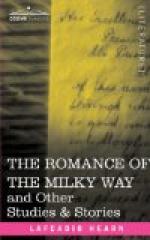Hi tomoshit[’e]
Kitsun[’e] no kwas[’e]shi,
Asobim[’e][26] wa—
Izuka no uma no
Hon[’e] ni ya aruran!
[Footnote 26: Asobim[’e], a courtesan: lit., “sporting-woman.” The [’E]ta and other pariah classes furnished a large proportion of these women. The whole meaning of the poem is as follows: “See that young wanton with her lantern! It is a pretty sight—but so is the sight of a fox, when the creature kindles his goblin-fire and assumes the shape of a girl. And just as your fox-woman will prove to be no more than an old horse-bone, so that young courtesan, whose beauty deludes men to folly, may be nothing better than an [’E]ta.”]
[_—Ah the wanton (lighting her lantern)!—so a fox-fire is kindled in the time of fox-transformation!... Perhaps she is really nothing more than an old horse-bone from somewhere or other...._]
Kitsun[’e]-bi no
Moyuru ni tsuk[’e]t[’e],
Waga tama no
Kiyuru y[=o] nari
Kokoro-hoso-michi!
[Because of that Fox-fire
burning there, the very soul of me
is like to be extinguished
in this narrow path (or, in this
heart-depressing solitude).[27]]
[Footnote 27: The supposed utterance of a belated traveler frightened by a will-o’-the-wisp. The last line allows of two readings. Kokoro-hosoi means “timid;” and hosoi michi (hoso-michi) means a “narrow path,” and, by implication, a “lonesome path.”]
II. RIKOMBY[=O]
The term Rikomby[=o] is composed with the word rikon, signifying a “shade,” “ghost,” or “spectre,” and the word by[=o], signifying “sickness,” “disease.” An almost literal rendering would be “ghost-sickness.” In Japanese-English dictionaries you will find the meaning of Rikomby[=o] given as “hypochondria;” and doctors really use the term in this modern sense. But the ancient meaning was a disorder of the mind which produced a Double; and there is a whole strange literature about this weird disease. It used to be supposed, both in China and Japan, that under the influence of intense grief or longing, caused by love, the spirit of the suffering person would create a Double. Thus the victim of Rikomby[=o] would appear to have two bodies, exactly alike; and one of these bodies would go to join the absent beloved, while the other remained at home. (In my “Exotics and Retrospectives,” under the title “A Question in the Zen Texts,” the reader will find a typical Chinese story on the subject,—the story of the girl Ts’ing.) Some form of the primitive belief in doubles and wraiths probably exists in every part of the world; but this Far Eastern variety is of peculiar interest because the double is supposed to be caused by love, and the subjects of the affliction to belong to the gentler sex.... The term Rikomby[=o] seems to be applied to the apparition as well as to the mental disorder supposed to produce the apparition: it signifies “doppelg[:a]nger” as well as “ghost-disease.”




